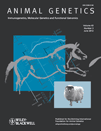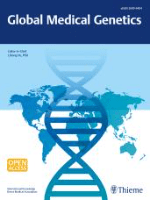
HEREDITAS
Scope & Guideline
Fostering Collaboration Through Cutting-Edge Research
Introduction
Aims and Scopes
- Genomic and Genetic Research:
The journal publishes studies that delve into genetic variations, mutations, and their implications in various diseases, including cancers, genetic disorders, and complex traits. - Bioinformatics and Computational Biology:
HEREDITAS emphasizes the use of bioinformatics tools and computational methods to analyze genomic data, identify biomarkers, and understand gene interactions. - Translational Medicine and Therapeutics:
Research that bridges basic genetic research with clinical applications, focusing on the development of novel therapeutic strategies based on genetic insights. - Molecular Mechanisms in Disease:
The journal includes investigations into the molecular pathways and mechanisms through which genetic factors influence disease progression and treatment responses. - Plant and Animal Genetics:
HEREDITAS covers genetic studies in agriculture and biodiversity, including the genetic improvement of crops and livestock, and the conservation of genetic resources.
Trending and Emerging
- Network Pharmacology and Systems Biology:
A significant increase in studies utilizing network pharmacology to explore the interactions of genes, proteins, and metabolites in therapeutic contexts, indicating a trend towards holistic approaches in understanding disease mechanisms. - Cancer Genomics and Precision Medicine:
There is a growing focus on cancer genomics, with research aimed at identifying genetic biomarkers for prognosis and treatment responses, aligning with the broader movement towards precision medicine. - Microbiome and Genetics Interactions:
Emerging themes include the exploration of the gut microbiome's role in genetic diseases, highlighting the interplay between genetic factors and microbial influences on health. - Long Non-Coding RNAs and Regulatory Elements:
Increased attention is being given to the functional roles of long non-coding RNAs and other regulatory elements in gene expression and disease, reflecting a deeper understanding of genomic regulation. - Integrative Multi-Omics Approaches:
Publications increasingly leverage integrative approaches that combine genomics, proteomics, and metabolomics to provide comprehensive insights into biological processes and disease states.
Declining or Waning
- Traditional Mendelian Genetics:
Research focusing solely on Mendelian inheritance patterns is less frequently published, as the field has evolved towards more complex genetic interactions and polygenic traits. - Single Trait Analysis in Complex Diseases:
Studies that investigate single genetic variants in isolation are declining, as there is a growing recognition of the multifactorial nature of diseases involving multiple genes and environmental interactions. - Basic Genetic Mapping Techniques:
There is a noticeable decrease in publications centered around basic genetic mapping techniques, such as linkage analysis, as advanced genomic sequencing technologies have become more prevalent.
Similar Journals

JOURNAL OF BIOSCIENCES
Advancing the Frontiers of Biosciences ResearchJOURNAL OF BIOSCIENCES, published by the Indian Academy of Sciences, has established itself as a pioneering platform in the fields of biosciences, encompassing diverse research areas such as agricultural and biological sciences, biochemistry, genetics, molecular biology, and medicine. With an impressive trajectory since its inception in 1979, the journal has achieved notable recognition, securing a Q1 ranking in Agricultural and Biological Sciences and maintaining its place in the top quartiles for Biochemistry and Medicine as of 2023. With Scopus rankings placing it at #32 in General Agricultural and Biological Sciences and #65 in General Biochemistry, Genetics, and Molecular Biology, the journal reaches the 85th and 70th percentiles respectively, reflecting its impact and relevance in current scientific discourse. Although it does not offer open access, the JOURNAL OF BIOSCIENCES remains crucial for researchers, professionals, and students dedicated to advancing knowledge and innovation within the biosciences, providing a vibrant forum for high-quality research and comprehensive reviews.

GENES & GENETIC SYSTEMS
Advancing the Frontiers of Genetic ResearchGENES & GENETIC SYSTEMS, an esteemed journal published by the Genetics Society of Japan, serves as a vital platform for the dissemination of innovative research within the fields of genetics, molecular biology, and medicine. Established in 1996 and based in Mishima, Shizuoka, Japan, this journal has actively contributed to the academic community, fostering collaboration and knowledge sharing among researchers and professionals. The journal’s impact can be seen through its category quartiles, which reflect its position in Genetics, Molecular Biology, and Medicine, and while it currently ranks in Q4 in Genetics and Q3 in Medicine (miscellaneous), it is poised for growth as it continues to publish pivotal studies. With a commitment to open access, GENES & GENETIC SYSTEMS ensures that research findings are freely accessible to the global scientific community, promoting a more inclusive approach to knowledge distribution. This journal is essential for students, researchers, and professionals seeking to stay informed of advancements in genetic research and its implications for the broader field of medicine.

ANIMAL GENETICS
Transforming Knowledge into Genetic SolutionsANIMAL GENETICS, published by WILEY, is a leading journal in the fields of Animal Science and Zoology, with a commendable Q1 classification for 2023, reflecting its critical role in advancing research and knowledge in animal genetics. Established in 1986, this journal has become a cornerstone for professionals, researchers, and students alike, providing a platform for innovative research that explores the genetic underpinnings of animal biology. With an ISSN of 0268-9146 and an E-ISSN of 1365-2052, it boasts a significant impact in both agricultural and biological sciences, as indicated by its ranking of #74 out of 490 in its category on Scopus, positioning it in the 85th percentile for Animal Science and Zoology. Readers can access high-quality, peer-reviewed articles that not only illuminate current advancements but also foster future research directions. While currently not an open access journal, ANIMAL GENETICS remains vital for anyone engaged in the exploration of genetics and its applications in medicine and beyond, with a continual commitment to publishing findings that shape the future of animal breeding, conservation, and genetics research.

Molecular Genetics & Genomic Medicine
Fostering global dialogue in molecular biology.Molecular Genetics & Genomic Medicine, published by WILEY, is an esteemed and open-access journal that has been a prominent source of knowledge in the fields of genetics and molecular biology since its establishment in 2013. With an ISSN of 2324-9269, it aims to provide a platform for the dissemination of novel findings and innovative research that pushes the boundaries of genomics and its clinical applications. The journal holds a Q3 categorization in Genetics, Clinical Genetics, and Molecular Biology, reflecting its growing influence in these disciplines, as evidenced by its Scopus rankings. Researchers, professionals, and students alike will find valuable insights and advancements in genomic medicine, making this journal an essential resource for those dedicated to the understanding and application of genetic and molecular research in healthcare. Located at 111 River St, Hoboken, NJ, Molecular Genetics & Genomic Medicine continues to foster a global dialogue within the scientific community, ensuring accessible knowledge for all.

Cold Spring Harbor Perspectives in Medicine
Uncovering Breakthroughs in Biochemistry and GeneticsCold Spring Harbor Perspectives in Medicine is a premier academic journal published by the esteemed COLD SPRING HARBOR LAB PRESS that has become a crucial resource in the fields of Biochemistry, Genetics, and Medicine. With an impressive impact factor and consistently ranked in the Q1 quartile for both biochemistry and general medicine—as evidenced by its Scopus rankings of #21 and #26 respectively—this journal serves as an essential platform for disseminating high-quality research and comprehensive reviews from leading experts. Covering a convergence of knowledge spanning from 2011 through 2024, it plays a vital role in advancing the understanding of medical science. Researchers, professionals, and students alike benefit from Cold Spring Harbor Perspectives in Medicine, which offers a depth of insight into critical topics, emerging trends, and essential developments within the medical community. Join the conversation and contribute to the ongoing dialogue that drives innovation and excellence in medical research.

Czech Journal of Genetics and Plant Breeding
Innovating plant science through open access knowledge.Czech Journal of Genetics and Plant Breeding is a premier academic journal dedicated to advancing the fields of genetics and plant science. Published by the esteemed Czech Academy Agricultural Sciences, this journal has been available as an Open Access resource since 2002, ensuring that essential research is freely accessible to a global audience. With an ISSN of 1212-1975 and an E-ISSN of 1805-9325, it continues to disseminate high-quality studies and findings from the vibrant scientific community in the Czech Republic and beyond. The journal operates within the Scopus ranks, securing 279th place in the category of Plant Science and 282nd in Genetics, reflecting its commitment to scholarly rigor. The Journal's objectives focus on exploring innovations in genetic research and plant breeding methodologies, offering valuable insights that foster collaboration among researchers, professionals, and students alike. As the journal converges from 2007 to 2024, it remains a vital publication for those seeking to stay abreast of developments in genetic diversity, crop improvement, and sustainable agriculture practices.

GENETICS AND MOLECULAR BIOLOGY
Connecting global minds through genetic research.GENETICS AND MOLECULAR BIOLOGY, published by the SOC BRASIL GENETICA, is a prominent journal dedicated to the advancement of knowledge in the fields of genetics and molecular biology. Since its inception in 1998, this Open Access journal has served as a vital platform for researchers, professionals, and students to disseminate their findings and engage with the latest innovations and discoveries. With an impact factor that reflects its growing influence, GENETICS AND MOLECULAR BIOLOGY ranks in the Q3 category for both genetics and molecular biology as of 2023, indicating its position within the academic community. The journal is indexed in Scopus, highlighting its commitment to maintaining rigorous peer-review standards while providing wide-reaching access to quality research. Operating out of Ribeirão Preto, Brazil, it fosters a collaborative environment for academic discourse and research development not only in Brazil but also globally. The journal encourages submissions that explore a wide range of topics in genetics and molecular biology, making it an essential resource for anyone involved in these dynamic fields.

Gene Reports
Empowering Researchers with Open Access GeneticsGene Reports is a prominent academic journal published by Elsevier that focuses on the rapidly evolving field of genetics. Launched in 2015, this journal serves as a pivotal platform for the dissemination of cutting-edge research, bridging the gap between basic and applied genetics studies. Although it currently holds a Q4 ranking in the Genetics category and stands at the 248th position out of 347 in Scopus rankings, its potential for growth is significant given the increasing interest in genetic research across various disciplines. With an E-ISSN of 2452-0144, Gene Reports aims to provide open access to original research articles, reviews, and short communications that advance the collective understanding of genetic mechanisms and their applications. As a publication that continues to shape the future of genetics, it is an essential resource for researchers, professionals, and students seeking to stay informed about the latest developments in this crucial field.

Global Medical Genetics
Transforming Healthcare Through Genetic InsightsGlobal Medical Genetics is a premier open-access journal dedicated to advancing the field of medical genetics. Published by GEORG THIEME VERLAG KG, this journal has been providing a dynamic platform for disseminating cutting-edge research and clinical findings since its inception in 2020. With the ISSN 2699-9404, it serves as an essential resource for researchers, healthcare professionals, and students who seek to explore the complex interplay between genetics and medicine. The journal aims to foster collaboration and innovation in the genetics community, addressing a diverse range of topics from genetic disorders to the application of genomics in personalized medicine. By providing open access to its content, Global Medical Genetics enhances knowledge sharing and accelerates advancements in healthcare, making it a vital asset for anyone invested in the future of genetics.

HUMAN GENETICS
Exploring the genetic blueprint of humanity.HUMAN GENETICS, published by SPRINGER, stands as a cornerstone journal in the field of genetics, offering a wealth of research insights since its inception in 1964. Hailing from Germany, this esteemed journal boasts an impressive Q1 ranking in both Genetics and Clinical Genetics, marking it among the top quartile of journals in these categories for 2023. With a notable Scopus rank of #7 in Clinical Genetics and a percentile ranking of 93, HUMAN GENETICS attracts significant attention from researchers and professionals dedicated to advancing our understanding of genetic influences on human health and disease. Although it does not currently offer Open Access options, the journal provides a critical platform for scholarly communication, aimed at disseminating groundbreaking findings in genetics and biotechnology. As the field evolves, HUMAN GENETICS continues to play an instrumental role in bridging the gap between laboratory research and clinical application, making it an essential resource for students and seasoned researchers alike.